Tomás MacGiolla: Óráid an Uachtaráin
1969 Sinn Féin Ard Fheis (January 1970)
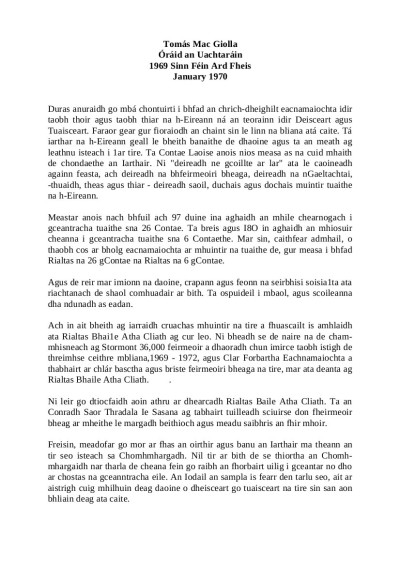
| Date: | January 1970 |
|---|---|
| Organisation: | Sinn Féin [Official] |
| Author: | Tomás MacGiolla |
| View: | View Document |
| Discuss: | Comments on this document |
| Subjects: |
Please note: The Irish Left Archive is provided as a non-commercial historical resource, open to all, and has reproduced this document as an accessible digital reference. Copyright remains with its original authors. If used on other sites, we would appreciate a link back and reference to The Irish Left Archive, in addition to the original creators. For re-publication, commercial, or other uses, please contact the original owners. If documents provided to The Irish Left Archive have been created for or added to other online archives, please inform us so sources can be credited.
Commentary From The Cedar Lounge Revolution
11th June 2012
Hard for those of us in the WP to believe, but it’s now two years since the death of Tomás MacGiolla. As I said at the time , MacGiolla was a giant of a man in every sense - a man of personal and political integrity, as well as someone of great political vision. He remained politically active to the end. This is his speech at the 1969 ard fheis, which was held in January 1970, and which saw the minority walk out to form the provisionals’ political wing. So the speech is significant for the reaction to the events of August 1969 in the north, and for the tensions of the looming formalisation of the split. It’s both of historical interest, and reflects the vision that drove Tomás and his politics to the end.
One thing that might surprise people looking back on Sinn Féin documents and the United Irishman from this period and into the early 1970s now is that they are not dominated by the north to the extent that we might expect. In the opening section of the speech, which was in Irish, MacGiolla addresed not the north, but the situation in the rural south, and especially in the west [the document lacks fadas, and there is a translation of the Irish included in this transcription of the speech]. Although parts of the speech might not have been worded in subsequent years as they were by MacGiolla in 1969, parts of it seem more contemporary.
But instead of trying to relieve the distress of the people, the Dublin government is actually making things worse. Even the Stormont government would not have the audacity and brazenness to force 36,000 farmers into emigration in the four year period 1969 -72, and then to call this plan, which will cause decimation amongst the small farmers of the country an Economic Development Plan, as the Dublin government has done.
The speech reflects the Sinn Féin fear in the 1960s that closer economic cooperation was the first step towards some kind of federal arrangement between the UK and the Republic.
It would be more honest with the Irish people and especially with their own party members, if with Mr. Lynch and his colleagues, Mr. Blaney, Boland, Haughey, Colley and others in Fianna Fail who have finally and formally abandoned the objective of an Independent Republic and who believe in federation with Britain, would form a Federal Party to advance their ideas rather than continue to advance them behind cloak of Republicanism.
The main thrust of the speech on the north is the necessity to continue with the civil rights campaign, and to ensure its non-sectarian character. The ultimate aim of unity through uniting the common people of all religions is laid out, despite the pressures that resulted from the events in the north.
Republicans and others are therefore still denied basic civil liberties and intend to press for a continued campaign to achieve them. What has been achieved has been got by a hard struggle. If the people now relax in their efforts, not alone will they make no further progress but much of what has been achieved will be gradually whittled away. In spite of the deliberately fermented sectarianism during the course of the Civil Rights campaign, the Civil Rights movement must renew its efforts to emphasise its non sectarian character. This is also the most difficult and most challenging task for Republicans in the 70’s. The unity of Catholic and Protestant workers is essential in the struggle against the Tory establishment and against British Colonial and neo-colonial rule in Ireland. A new nation will be built, not through the efforts of the Belfast, Dublin or London Government but through the efforts of the common people of Ireland. The mass of the people of all religions can be united behind a coherent ideological stand and this Republicans are now trying to inject into politics North and South.
For MacGiolla, the task remained the placing of economic and political power in the hands of the plain people of Ireland.
The power of the establishment here can be smashed by the same methods as were used in the 6 counties. To do so the broad mass of people must be united behind a well defined programme. I believe the programme on which such unity can be achieved is a programme for the re-conquest of Ireland set out as a series of Economic, Social, and Cultural demands. We must therefore formulate such a programme and endeavour to unite all radical and progressive groups in a movement for the achievement of these demands, making use of all the methods of agitation and political action which would be likely to help our objective.
A clear insight then into the strategic intentions of the leadership of which Tomás MacGiolla was a part, and of his determination not to be knocked off course.
More from Sinn Féin [Official]
Sinn Féin [Official] in the archive
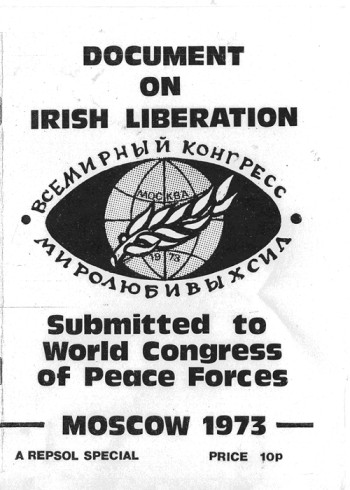
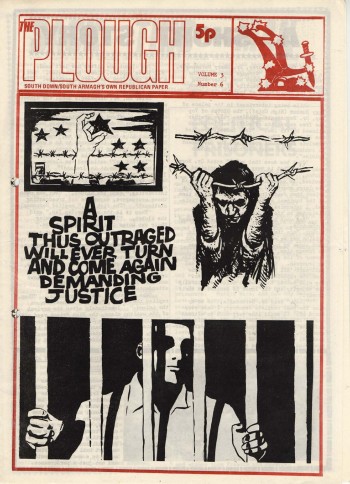
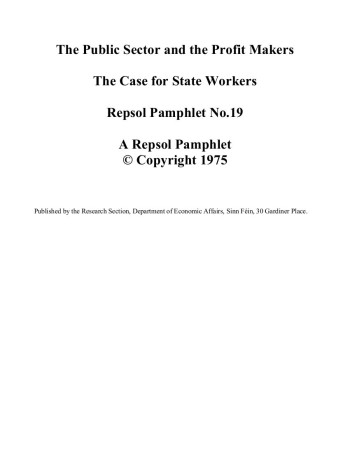
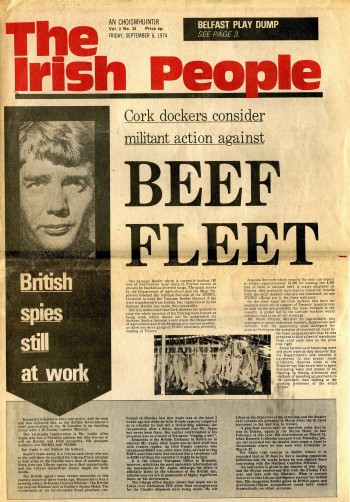
Comments
No Comments yet.
Add a Comment
Comments can be formatted in Markdown format . Use the toolbar to apply the correct syntax to your comment. The basic formats are:
**Bold text**
Bold text
_Italic text_
Italic text
[A link](http://www.example.com)
A link
You can join this discussion on The Cedar Lounge Revolution
By: The Weekly Archive Worker – Quickborn: Maulkorb für die demokratische Jugend? « Entdinglichung Thu, 14 Jun 2012 08:31:50
[…] * Tomás MacGiolla: Óráid an Uachtaráin, Sinn Féin 1969 Ard Fheis (Held January 1970) […]
Reply on the CLR